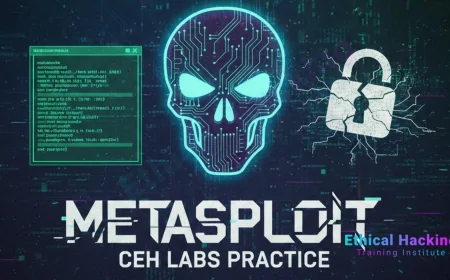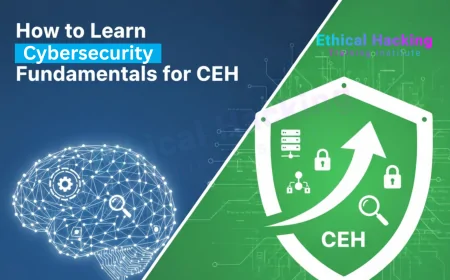How to Select the Right Ethical Hacking Institute in 2025
Discover the step-by-step guide on how to select the right ethical hacking institute in 2025. Learn what factors to consider, skills to master, and how the right institute can launch your cybersecurity career successfully.

Introduction
In today’s digital world, cybersecurity has become a top priority. As cyber threats grow, so does the demand for skilled ethical hackers. Whether you’re a fresh graduate, IT professional, or a cybersecurity enthusiast, choosing the right ethical hacking institute in 2025 can set the foundation for a successful career.
This guide will walk you through step-by-step how to select the best ethical hacking institute, ensuring you invest your time, money, and energy in the right place.
Why Ethical Hacking is a Career of the Future
Ethical hacking is no longer just an optional IT skill — it is a mandatory shield for companies to protect sensitive data and digital assets. With increasing incidents of ransomware, phishing, DDoS attacks, and data breaches, organizations need certified ethical hackers to strengthen their security posture.
In 2025, the global cybersecurity market is expected to reach over $500 billion, making ethical hacking one of the most secure and highly paid career paths.
Importance of Choosing the Right Ethical Hacking Institute
Selecting a reputable ethical hacking institute can:
-
Provide a structured learning path.
-
Offer hands-on, real-world experience.
-
Prepare you for global certifications like CEH, CPENT, OSCP.
-
Increase your chances of getting placed at top cybersecurity companies.
-
Help you build a strong professional network in the cybersecurity community.
Step-by-Step Roadmap: How to Select the Right Ethical Hacking Institute in 2025
1. Check Institute Accreditation and Reputation
Start by researching the credentials of the institute. Ensure it is:
-
Registered and authorized to conduct professional training.
-
Partnered with recognized cybersecurity organizations like EC-Council, Offensive Security, CompTIA.
-
Well-reviewed online by former students.
Pro Tip: Look for institutes that are Accredited Training Centers (ATCs).
2. Course Curriculum Relevance
The best institutes offer updated and industry-aligned course content.
Ensure that the curriculum covers:
-
Ethical hacking fundamentals
-
Penetration testing
-
Web application security
-
Network security
-
Cloud security
-
Cyber forensics
-
Tools like Metasploit, Burp Suite, Nmap, Wireshark
Tip: The course should match the latest cybersecurity trends of 2025.
3. Trainers’ Industry Experience
Learning from experienced professionals can make a huge difference.
Verify:
-
Trainer profiles, LinkedIn reviews
-
Years of practical cybersecurity experience
-
Certifications like CEH Master, OSCP, CISSP, CISM
A trainer with real-world experience can provide practical insights and live case studies that pure academicians cannot.
4. Practical Labs and Real-World Projects
Theory alone is not enough. Ethical hacking is a skill that demands practice.
Choose an institute that offers:
-
Hands-on labs
-
Capture the Flag (CTF) competitions
-
Live penetration testing projects
-
Simulated hacking environments
Remember: Practical exposure builds the confidence to work on real cybersecurity incidents.
5. Certification Preparation
Ensure the institute prepares you thoroughly for globally recognized certifications such as:
-
CEH (Certified Ethical Hacker)
-
CPENT (Certified Penetration Testing Professional)
-
OSCP (Offensive Security Certified Professional)
-
CompTIA Security+
-
CHFI (Computer Hacking Forensic Investigator)
Bonus Tip: Institutes offering certification exam vouchers or mock tests are a big plus.
6. Placement Assistance and Career Support
An ethical hacking course without career support leaves you half-prepared.
Opt for institutes that offer:
-
100% placement assistance
-
Resume building sessions
-
Interview preparation
-
Internship opportunities
-
Career counseling sessions
Look for institutes with tie-ups with cybersecurity firms and good placement records.
7. Infrastructure and Learning Environment
Visit the institute (if possible) or ask for a virtual tour.
Check:
-
Availability of computer labs with updated tools
-
Dedicated cybersecurity labs
-
Fast internet and technical resources
-
Comfortable classroom/online learning setups
A professional environment enhances learning efficiency.
8. Student Reviews and Success Stories
Real student feedback speaks volumes.
Look at:
-
Google Reviews
-
Testimonials on the institute’s website
-
LinkedIn alumni profiles
Positive success stories, especially placements in reputed companies, validate the institute’s credibility.
9. Flexibility: Online, Offline, or Hybrid Learning
Post-pandemic, flexible learning is critical.
Choose an institute that offers:
-
Online live classes
-
Offline in-person sessions
-
Hybrid (blended) learning options
Flexibility ensures you can learn even with a busy schedule.
10. Cost and Value for Money
While cost should not be the only deciding factor, value for money matters.
Check:
-
Course fees vs offerings
-
Installment payment options
-
Scholarships or discounts
Remember, investing in a good course is investing in your future.
Top Skills You Will Learn from a Good Ethical Hacking Institute
-
Footprinting and reconnaissance
-
Scanning networks and vulnerabilities
-
Gaining system access and privilege escalation
-
Web server hacking and application hacking
-
Malware analysis and reverse engineering
-
Cloud security fundamentals
-
Cryptography and encryption
-
Cybersecurity compliance standards (GDPR, HIPAA)
Career Opportunities After Completing Ethical Hacking Courses
-
Ethical Hacker
-
Penetration Tester
-
Information Security Analyst
-
SOC Analyst
-
Security Consultant
-
Vulnerability Assessment Specialist
-
Cybersecurity Architect
-
Malware Analyst
-
Incident Responder
-
Risk and Compliance Officer
With experience, you can also grow into roles like Cybersecurity Manager, CISO (Chief Information Security Officer), or even start your own cybersecurity firm.
Average Salary Trends in India for Ethical Hackers in 2025
| Role | Average Salary (INR) |
|---|---|
| Entry-Level Ethical Hacker | ₹6–8 LPA |
| Mid-Level Penetration Tester | ₹12–18 LPA |
| Senior Cybersecurity Analyst | ₹20–30 LPA |
| Cybersecurity Manager | ₹30–50 LPA |
| Chief Information Security Officer (CISO) | ₹60 LPA+ |
Common Mistakes to Avoid While Choosing an Ethical Hacking Institute
-
Choosing based only on low fees
-
Ignoring trainer experience
-
Overlooking practical training opportunities
-
Skipping detailed curriculum analysis
-
Not checking placement support
-
Falling for fake promises and certifications
Be smart and verify before you invest.
Conclusion
Choosing the right ethical hacking institute in 2025 can transform your cybersecurity career.
Look for an institute that offers the perfect combination of expert trainers, real-world labs, globally recognized certifications, and solid placement support.
The right choice today can open doors to exciting global opportunities tomorrow.
Start your journey into the world of cybersecurity with the right training — and make a real difference in protecting the digital world!
FAQs
Q1: How important is certification when choosing an ethical hacking course?
Answer: Certifications validate your skills and make you highly employable. Always prefer courses that prepare you for top certifications.
Q2: What if I am from a non-technical background? Can I learn ethical hacking?
Answer: Yes! Many institutes offer beginner-friendly courses that start from the basics.
Q3: Should I choose online or offline ethical hacking classes?
Answer: Choose based on your convenience. However, ensure the course is interactive and hands-on.
Q4: How much does an ethical hacking course cost in India in 2025?
Answer: Fees range from ₹50,000 to ₹2,00,000 depending on the institute, certification, and training duration.
Q5: How long does it take to become a certified ethical hacker?
Answer: It typically takes 6–9 months including learning, practice, and certification preparation.
Q6: What certifications should a good ethical hacking institute prepare me for?
Answer: Look for institutes offering preparation for CEH, CPENT, OSCP, CompTIA Security+, and other globally recognized certifications.
Q7: Is hands-on training more important than theory in ethical hacking courses?
Answer: Yes, practical skills are critical. Real-world labs, simulations, and live projects matter more than just theory.
Q8: Can I learn ethical hacking part-time while working or studying?
Answer: Absolutely! Many institutes offer flexible weekend or evening batches to suit working professionals and students.
Q9: How do I verify if an institute really offers placement support?
Answer: Check for placement records, student testimonials, partnerships with cybersecurity companies, and LinkedIn alumni profiles.
Q10: What minimum facilities should an ethical hacking institute provide?
Answer: Dedicated cybersecurity labs, updated software tools, fast internet, certified trainers, and access to practice environments.
Q11: What’s the ideal batch size for an ethical hacking course?
Answer: Smaller batches (15–20 students) are better, ensuring personal attention, interaction, and hands-on practice.
Q12: Should I prefer an institute that offers internship opportunities?
Answer: Yes! Internships provide real-world experience and greatly enhance your resume.
Q13: Is an ethical hacking diploma better than certification?
Answer: Certification like CEH or CPENT is more recognized by employers compared to general diplomas.
Q14: How important are alumni reviews when selecting an institute?
Answer: Very important! Honest alumni feedback gives real insight into the quality of training, support, and placements.
Q15: What is the minimum qualification to join an ethical hacking institute?
Answer: Most institutes require basic computer knowledge. Some may prefer students with IT, engineering, or cybersecurity backgrounds, but many accept beginners.
Q16: Can ethical hacking be learned without coding knowledge?
Answer: Basic coding helps but is not mandatory at the beginning. A good institute will gradually teach you essential scripting skills (Python, Bash, etc.).
Q17: How can I differentiate between a genuine and a fake cybersecurity institute?
Answer: Verify their accreditation, trainers' qualifications, placement partnerships, official website, and student reviews.
Q18: Are online ethical hacking courses effective in 2025?
Answer: Yes, if the online course is interactive, provides lab access, live support, and assignments.
Q19: How much practical exposure should a good course provide?
Answer: Ideally, 60–70% of the course should involve hands-on labs, real-world simulations, and hacking exercises.
Q20: Can ethical hacking training help me work internationally?
Answer: Absolutely! Certifications like CEH, CPENT, and OSCP are globally recognized and open doors to cybersecurity careers worldwide.
What's Your Reaction?
 Like
1
Like
1
 Dislike
0
Dislike
0
 Love
0
Love
0
 Funny
0
Funny
0
 Angry
0
Angry
0
 Sad
0
Sad
0
 Wow
0
Wow
0

















